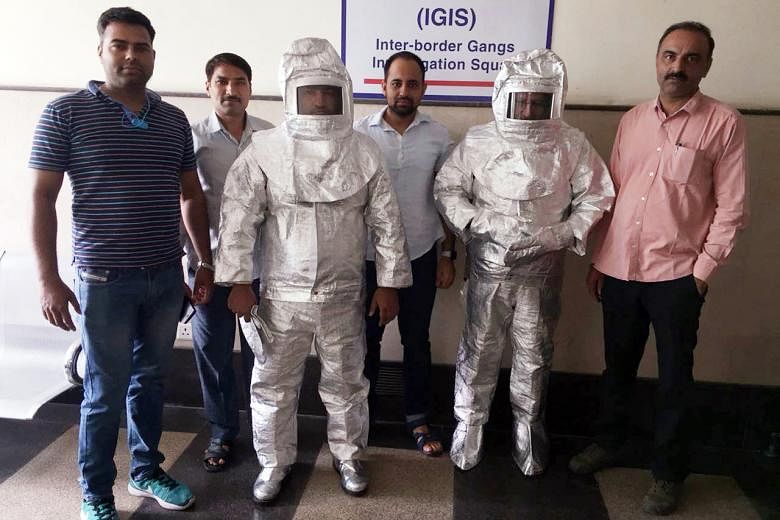NEW DELHI - A 14-year-old girl from Maharashtra being selected as a panellist to review proposals and applications for fellowships with the US National Aeronautics and Space Administration (Nasa) is a feel-good story that caught the fancy of many in India last month.
Media outlets reported on the girl's achievement in glowing terms and the local member of Parliament even congratulated her. But the jubilation was short-lived, an all-too-familiar and disappointing denouement involving several other Nasa-related claims in India.
Alert social media users reported many loopholes in the girl's claims - including alleged fake certificates - and found that the journal that had accepted to publish her paper titled "We Live In A Black Hole?" was a predatory one. A predatory journal is one that publishes papers by charging authors but without reviewing articles for quality. It has yet to publish the girl's paper.
When Boom, an Indian fact-checking website, reached out to Nasa, it said the teen was selected as a panellist through a third-party service but her selection was based on false information about her background. The agency added it is reviewing the process of verifying potential panellists' backgrounds.
When The Straits Times reached out to the girl's family, her mother said the family stands by their claims and that they are shielding their daughter from any further public interaction given the stress she had been exposed to. ST has chosen to protect the minor's privacy and not use her name.
The mother refused to share any of her research papers and added that they could not afford to pay the journal the fee it had asked to publish the paper.
"She will shine and prove everyone wrong in another two years," the girl's mother told ST, adding that she had been paid US$675 (S$908) from an American bank account for her work for Nasa.
There have been several other Nasa-related controversies in India in the last few years.
In December 2019, a story about a 14-year-old boy from Odisha being selected for a Nasa contest duped many. The boy, who came from an economically weak background, made a drone that reportedly could land at inaccessible spots. A local politician even gave the boy's family 50,000 rupees (S$922) to support his travel to the United States. It turned out the 'selection' was based on a forged email sent by another student.
Dr Aniket Sule, chairman of the Public Outreach & Education Committee of the Astronomical Society of India, said these scams recur because children genuinely interested in astronomy have few opportunities in India to make a name for themselves.
"There are many people who are looking for such opportunities and if they don't get one, they make up such stories," he told ST, adding that the Indian Space Research Organisation (ISRO) should do more school-level outreach.
"Many of these students do not see ISRO as an aspirational place where they desire to be," Dr Sule said. "Going to Nasa or working for it, on the other hand, has captured the imagination of many more kids."
This popularity has also led to instances where contests for students are organised charging participants a hefty fee, with winners often promised a privileged trip to Nasa when all they do is visit its Visitor Centers that are accessible to the public.
"Nasa is not bothered to invite kids like this. It is just middlemen exploiting gullible parents to make a fast buck," said Dr Priya Hasan, a professor of physics and astronomy, who runs Shristi Astronomy that familiarises children with the subject. "You just say 'Nasa-Nasa' and people come for it!"
In 2019, parents of a school in Ludhiana, in Punjab state, filed a police complaint against a travel agent couple and their son after they took money from around 148 students, promising to send them on a trip to Nasa. Parents paid 280,000 rupees per student but the accused failed to arrange a visa, and refused to return the money.
Other perpetrators of such scams also thrive using Nasa's cover. A father-son duo was arrested in the capital, Delhi, in 2018 for duping people out of millions of rupees by luring them into investing in what they called a 'rice puller', a "special device" they wanted to sell to Nasa. There have been similar scams in China and Malaysia, among other countries.
India has also seen long-standing false claims around an incredibly high number of Indian-origin employees at Nasa; in 2019, one such viral message erroneously claimed 58 per cent of its employees were Indian. There are also recurring dubious claims of Sanskrit being the most appropriate language for writing computer algorithms and of a certain "Mission Sanskrit" at Nasa, something that gets reiterated by top Indian politicians as well.
The agency has served as a cloak for another viral hoax. A purported glittering satellite image of India from Nasa is resuscitated every year around Deepavali with the claim that it shows Indians celebrating the "Festival of Lights". The photo is actually a composite image that uses satellite photos from the US Defense Meteorological Satellite Program and shows multiple years of lighting to indicate population growth.
Countering this doctored claim, Nasa released a real satellite image of India around the festival - a far more subdued one - in 2012. "In reality, any extra light produced during Diwali (Deepavali) is so subtle that it is likely imperceptible when observed from space," it added.
Dr Hasan called for a greater focus on enabling people, especially parents, to detect fake news that can be done easily in most cases. "When you get something on WhatsApp or some other source, how gullible are you? Do you actually check it before you start declaring it to the world?" she added. "That's something we need to work on."


